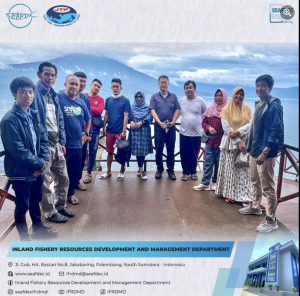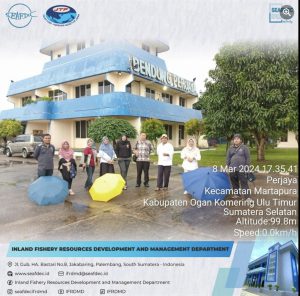A Survey of Inland Fisheries in South Sumatra Province
SEAFDEC/IFRDMD conducted an activity in the South Sumatra Province of Indonesia under the project entitled Management Scheme of Inland Fisheries in the Southeast Asia Region on 8 – 10 March 2024. The mission was led by the Deputy Chief, Mr. Tomohito Shimizu. The activity involved the Fisheries Extension Officers of the Ministry of Marine Affairs and Fisheries (MMAF).
During the survey at Perjaya Dam, Martapura Sub-district, East OKU District, the team observed fish ladders. The Fisheries Extension Officers explained the facility and the fisheries activities around the dam.
Perjaya Dam is part of the Komering irrigation network infrastructure. It dams the Komering River, which can irrigate the districts of Komering, Macak, Belitang, and Lampung Province. It is located about 240 km from Palembang City. Dams can prevent fish from migrating to spawn, feed, shelter, and avoid pollution and extreme environments. This condition can disrupt the life cycle of fish, leading to a decline in the number and species of fish. Some freshwater fish species may become extinct. Therefore, it is necessary to ensure that river connectivity is maintained. A fishway is an aquatic construction designed to help fish pass through artificial barriers in rivers. With a fishway, fish can migrate upstream and downstream of the river or vice versa. The Perjaya Dam is one of 3 other weirs with a fishway in Indonesia.
To promote the importance of inland fisheries for livelihoods and the environment, the team held a focus group discussion at the Office of Fish Hatchery Center, Banding Agung Village, OKU Selatan Regency. There were 39 participants, including six women from fishers and fish product producers. The Deputy Chief of SEAFDEC/IFRDMD, Mr Tomohito Shimizu, opened the agenda. In his remarks, Mr Shimizu explained that the purpose of this activity was to obtain information on the community’s concern for the environment of Lake Ranau. He asked the participants to answer the questions asked to provide a better planning and management framework that focuses on the real problems and what causes them across the ecological, social, and economic dimensions of sustainable development. It will result in better resource management in Lake Ranau, increasing the fish demand and securing a more significant market share.
The team also visited Lake Ranau by boat to observe water quality and interviewed fishers and fish farmers. Lake Ranau is an important freshwater resource that supports the quality of human life by providing services such as water supply, recreation, and socio-economic interests. Fish resources contribute to the socio-economic development of communities living around the waters. Fishers and fish farmers in Lake Ranau are the main stakeholders who have a direct interest in fish resources, as they depend on fish resources or are directly involved in exploiting them.


